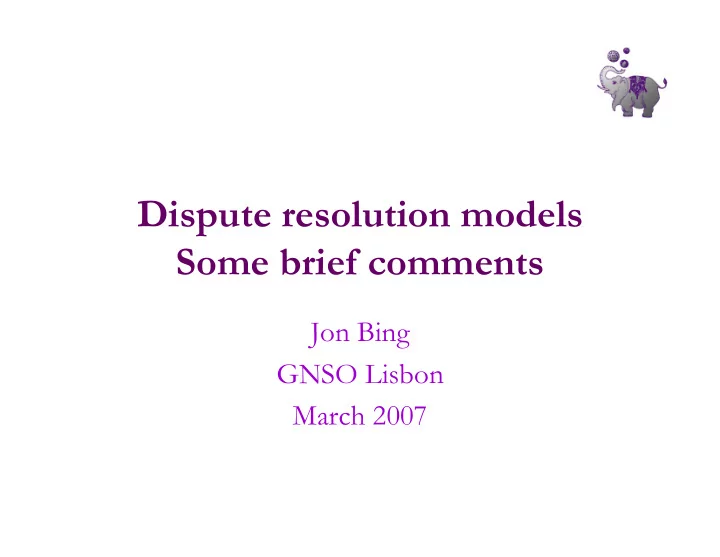

Dispute resolution models Some brief comments Jon Bing GNSO Lisbon March 2007
Negotiations • Always based on consent between the parties (may be governed by original contract) • Result have to be accepted by the parties • Applies as contract between the parties • If inconclusive, no solution is reached
Mediation • Always based on consent between the parties (may be governed by original contract) • Negotiations or dialogue directed by third party (referee) • Referee may propose solutions • If proposals rejected, no solution is reached if parties have not contracted for acceptance
Arbitration I • Alternative to litigation, typically based on legislation • Based on contract between the parties, formal restrictions often apply • Contract specifies forum, law of forum ( lex forum) govern proceedings • Contractual choice of law generally accepted, may be different from lex forum
Arbitration II • Panel named according to procedural provisions in contract or legislation • Typically the parties each name one panellist, these name a chair – or chair named by specified institution (court) • Decision binding upon the parties • If compliant with New York convention, excecuted in another country party to the convention
Arbitration III • Advantages of arbitration: 1. Speedy dispute resolution 2. Only one instance 3. Control of expertise 4. Control of procedures and time 5. Control of costs 6. Confidentiality 7. International execution (if qualified)
Arbitration IV • WIPO dispute resolution for domain names example of arbitration • Based on contract • Executed by registrar (self executing) • Probably not qualify according to New York convention • May be challenged by national courts • Reputation of WIPO important for international acceptance
Consumer tribunals • Dispute resolution mechanisms typically based on self-regulation (government support) • Simplified and low-cost procedure • Decision in principle not binding, but followed by consensus • Decision only executed within jurisdiction • Attempts to introduce consumer tribunals for international electronic trade
Litigation • Based on legislation • Any party with a qualified interest in a dispute may bring civil action before a court • The court will typically uphold contractual clauses, including arbitration clause, choice of forum and law • Decision only executed by authorities of the country of the forum, but there are conventions for international execution of decisions in civil cases
Small claims courts • Simplified procedures for small claims • Varies widely between jurisdictions • May be special tribunal, may be special procedure before the general courts • Many examples of high level of computerisation
Challenges for string evaluation • Parties to the dispute not bound by contract • Courts of several countries may have jurisdiction • Execution in practice depend on presence within the jurisdiction • Uncertain relation to ICANN policies and contracts • Recognition of decisions by alternative dispute resolution in practice rely on reputation and consensus • Few international ”civil courts” – treaties rarely introduce dispute resolution between individuals • WTO dispute resolution exceptional, only between states
Categories if dispute scenarios
Recommend
More recommend